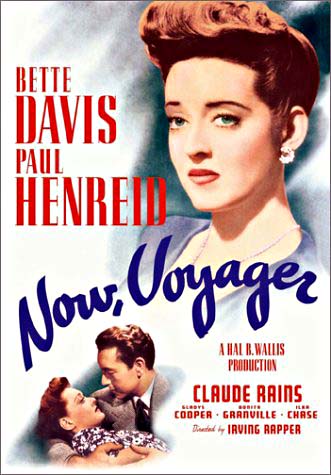 The untold want by life and land ne’er granted,
Now voyager sail thou forth to seek and find.
The untold want by life and land ne’er granted,
Now voyager sail thou forth to seek and find.
-Walt Whitman
My favourite shot of Bette Davis appears about a third of the way through Now, Voyager, when she steps out onto a ship’s gangway. The camera glides from her sleek heels to chic hat, its wide brim and veil shading her eyes as she scans the crowd. She is elegant, alluring, a little insecure and utterly breathtaking. It’s a dazzling moment and endlessly watchable, not unlike the film itself.
Now, Voyager is the story of Charlotte Vale (Bette Davis), browbeaten by her domineering mother (Gladys Cooper) until a nervous breakdown puts her in the care of sympathetic Dr. Jaquith (Claude Rains). After recovering, she tests her new-found independence on a cruise to South America, falling in love with the unhappily married Jerry Durrance (Paul Henreid). Charlotte returns home a more confident woman, but must still come to terms with the mother whose cruelty nearly drove her mad.
I really love this movie. Whenever I tune in to TCM and find it’s on, I invariably end up watching as much as I can, and wondering why I haven’t bought the DVD yet. Charlotte’s transformation from helpless victim to independent woman merits repeated viewing.
In fact Charlotte Vale should automatically earn a place on any serious list of strong female characters on film. When we first meet her she’s been stifled by a lifetime’s worth of neglect- spinster Aunt Charlotte, ugly duckling in ugly clothes, the forgotten Vale who might as well be seeing the world through a veil. Her mother controls every aspect of Charlotte’s existence, effectively smothering her to death. That she survives is a considerable achievement. From then on each choice Charlotte makes is firmly her own: to love Jerry truly and passionately, but still give him up; to face her mother without fear; and to live her life as she feels best. She goes out to meet the world on her own terms, and flourishes.
If Now, Voyager is all about Charlotte, then it is also all about Bette Davis. This is one of her finest performances and considering it’s Bette Davis, that’s saying a lot. She inhabits the role so completely that I was astonished to learn she was not the first choice for it. Producer Hal B. Wallis originally wanted either Irene Dunne or Ginger Rogers and Davis lobbied hard for the part. Her persistence paid off handsomely. Watch, for example, what our heroine believes is her last farewell to Jerry and tell me your heartstrings aren’t tugged just a little.
Of course the rest of the cast is good enough to have you reaching for tissues too. Paul Henreid did a nice line in chivalrous love interests- see Song of Love, Deception and Casablanca– and excels himself here, ensuring Jerry’s courtly love is sincere but never mawkish. The ever-brilliant Claude Rains helps make Dr. Jaquith one of the most benevolent psychiatrists in fiction, while Gladys Cooper is alarmingly convincing as Mrs. Vale, displaying all the compassion of a glacier. I was also impressed by Mary Wickes as jocular, no-nonsense nurse Dora and Janis Wilson as the emotionally fragile Tina.
The film also boasts a superb score by Max Steiner, exquisite black and white cinematography and an oft-imitated final scene.
Now, Voyager is a touching, beautifully told story that is sure to resonate with anyone who has ever felt lost or shut off from the world. Watch it.
Leave a Reply